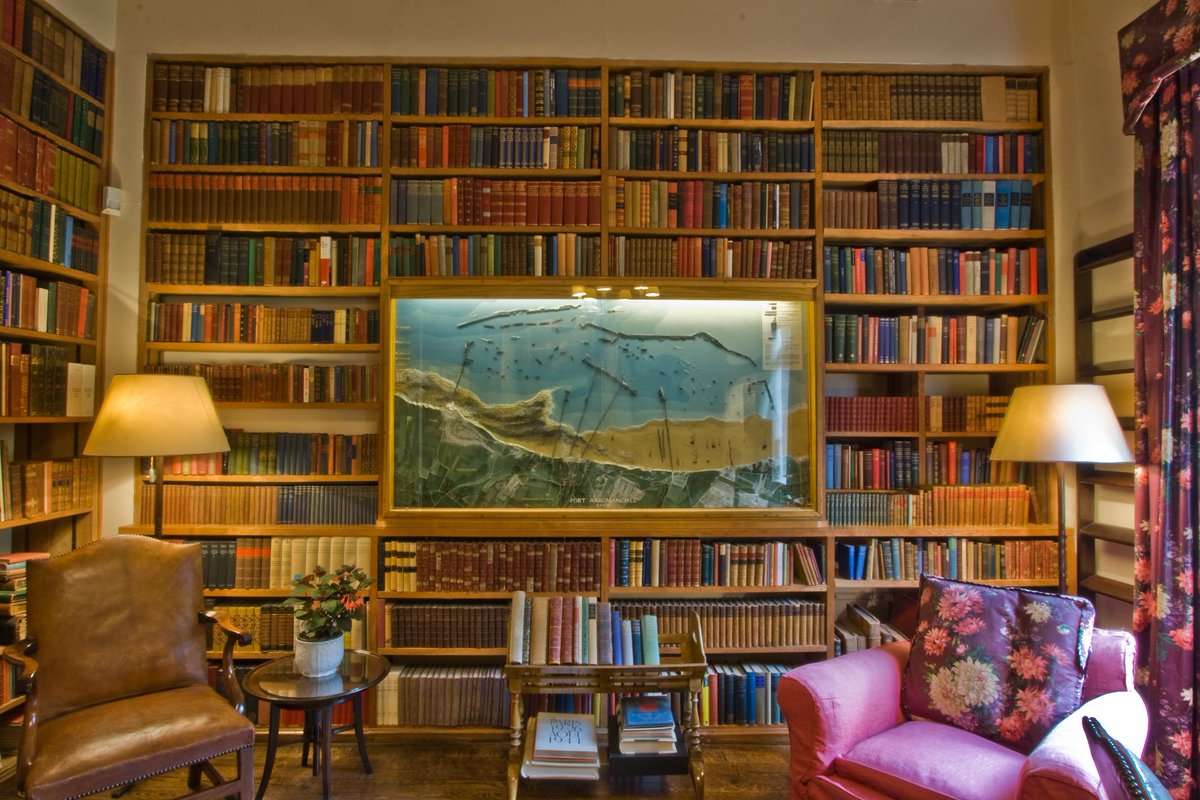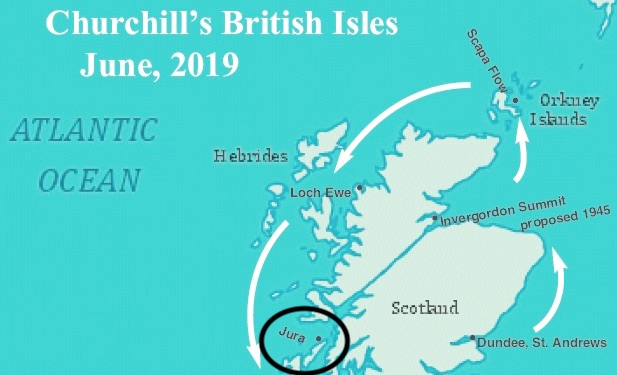
Lectures at Sea (1): Churchill and the Myths of D-Day
“Churchill and the Myths of D-Day is excerpted from a lecture on the 2019 Hillsdale College Round-Britain cruise. Hillsdale cruises with “lectures at sea” are an annual event, usually occurring in May or June. For information on the 2020 cruise to Jerusalem and Athens, click here.
I’m here to talk about Winston Churchill. I know this audience knows who he was! Did you know a survey of British schoolchildren reveals that one in five think he was a fictional character? And better than half think Sherlock Holmes was a real person?
My book is about the non-fictional Churchill. It exposes all the tall tales, exaggerations, lies, myths, rumors and distortions about him over the years. Nowadays, the old adage that you don’t speak ill of the dead is obsolete. Nowadays, it seems important to deconstruct history. Especially old-fashioned concepts like heroes.
The tool is the Internet. Without straying from your keyboard, you can anonymously spout whatever nonsense that occurs to you. The late Umberto Eco, the Italian writer and critic, nicely described this phenomenon: “Social media gives legions of idiots the right to speak when they once only spoke at a bar after a glass of wine, without harming the community….It’s the invasion of the idiots.”
* * *
Churchill, who won a Nobel Prize, and did a few other things, cannot reply. He lies at Bladon in English earth, “which in his finest hour he held inviolate.” I think he’d love the controversy he stirs on media he never dreamed of. He once said the vision “of middle-aged gentlemen who are my political opponents being in a state of uproar and fury is really quite exhilarating to me.”
My book has thirty-seven chapters. I won’t cover them all! A favorite Churchill family story involves a Yale commencement speaker who told his audience, Y is for youth, A for achievement, L for loyalty, E for enterprise. He gave 20 minutes on Youth. He was ten minutes into Achievement when a voice came from the audience: “Thank God he didn’t go to the Massachusetts Institute of Technology.”

Our cruise around Britain relates to interesting Churchill myths. I’ll put this map up again in the Q&A. On it, I’ve labeled every place around the British Isles with a Churchill connection. If any suggest a question, please ask. For example, what does Churchill have to do with the Isle of Jura in the Hebrides?
“Churchill Opposed D-Day”
Thursday 6 June marks the 75th anniversary of D-Day. We were opposite Normandy just after leaving port. Big party going on over there. Churchill, of course, was vital to D-Day. Yet he was charged with opposing it—and the charges began during the war itself. He wrote in his memoirs:
In view of the many accounts which are extant and multiplying of my supposed aversion [to the invasion], it may be convenient if I make it clear that from the very beginning I provided a great deal of the impulse and authority for creating the immense apparatus and armada for the landing of armour on beaches, without which it is now universally recognised that all such major operations would have been impossible.
No “Second Front” in 1942
What Churchill feared was the invasion being thrown back with losses. He’d seen that in the Gallipoli landings in World War I. He wanted to be sure of success. On the eve of D-Day, he remained anxious. “Do you realise,” he asked his wife, “that by the time you wake up in the morning, “20,000 men may have been killed?” Fortunately not.
In reality, Churchill was demanding what he called “a lodgment on the continent” before the Russians or Americans were in the war. As early as June 1940, a few weeks after Dunkirk, he was asking about relanding on French beaches. In 1941, after Hitler invaded Russia and Japan attacked in the Pacific, clamor grew for a so-called Second Front. But in March 1942 the Americans said they couldn’t provide more 130,000 troops in the near future.
Disappointed but still anxious to prepare, Churchill proposed the “Mulberry Harbours,” which he first thought of in 1917: floating piers. “They must float up and down with the tide,” he directed. “Let me have the best solution worked out. Don’t argue the matter. The difficulties will argue for themselves.” The Mulberries proved indispensable. A fine model of Port Arromonches, used by British and Canadian forces, is in the library at Chartwell.
Nor in 1943…
With a French landing impossible in 1942, the Anglo-Americans opted for North Africa. Meanwhile, the Americans promised to get 27 divisions to England for the Second Front by Spring 1943. Actually, counting North Africa and the Atlantic, there were already three fronts. But U.S. troop levels fell short. “We had been preparing for 1.1 million men,” Churchill wrote President Roosevelt. FDR replied that he had no wish to give up on 1943, but the troops and landing craft were still insufficient.
So the Allies invaded Sicily in July 1943 and Italy proper in September. The invasion of France (now named Operation Overlord) was postponed until 1944. But the American chiefs were reluctant to divert materiel to the Italian campaign. Churchill’s Chief of the Imperial General Staff, General (later Field Marshal) Alan Brooke wrote: “It is becoming more and more evident that our operations in Italy are coming to a standstill.” Stalin, Churchill complained, was “obsessed by this bloody Second Front. Damn the fellow.” Italy, he declared, must be fought until victory.
When Rome fell two days before D-Day, seven crack divisions were immediately pulled out of Italy for Operation Dragoon, a supplemental invasion of southern France, in August. Churchill viewed this as a pointless sideshow. In Italy the Allies advanced northward, but it was slow going, and fighting continued until April 1945.
Though disappointed over Italy, Churchill continued to support Overlord. He missed nothing—even the fake Army under General Patton, which convinced the Germans the main invasion would come 200+ miles north of Normandy. Meeting regularly with Eisenhower, he covered every aspect of the landings. He even enlisted the London Fire Brigade, which provided pumps for the Mulberry Harbors.
D-Day myths and misinformation
Given all this, it was astonishing to read in 2016 the same old accusations. On 12-13 August 1943, Churchill was with Roosevelt at Hyde Park. There, according to Commander-in-Chief, by Nigel Hamilton, Roosevelt threatened to withhold U.S. atom bomb secrets from Britain unless Churchill supported invading France in 1944. According to Hamilton, Churchill was so outraged that he woke up in the night ‘unable to sleep and hardly able to breathe.’”
No evidence was offered for this other than Churchill’s quote, which had nothing to do with FDR. “It was so hot,” Churchill wrote, “that I got up one night because I was unable to sleep and hardly to breathe, and went outside to sit on a bluff overlooking the Hudson River.” Thus Hamilton’s thesis collapses on its face—another myth with no basis in reality.
He took what the war gave him
Churchill in war manifested two traits: eagnerness and flexibility. War is mostly chance, he said. “You have to run risks. There are no certainties n war. There is a precipice on either side of you—a precipice of caution and a precipice of over-daring.”
Disappointed by the slow build-up for Overlord, he saw opportunity in Italy—though he certainly did not, as some insist, propose invading Germany over the Alps. Franklin Roosevelt, with good reason, resisted Churchill’s more fanciful proposals farther east. “Winston has 100 new ideas a day,” FDR cracked, and three of them are good.” I think the balance was better than that—but FDR was not entirely wrong. Legitimate criticism has its place. But not fairy tales.
President Roosevelt decided against invading France in 1943 when he realized that the forces to assure success were insufficient. Churchill too realized that circumstances had changed, and when Mediterranean opportunities arose he pursued them. Both leaders wanted to win the war quickly. Churchill challenged the assumption that Normandy was the only way to wear down the enemy. But he worked as hard as anyone to ensure its success.






